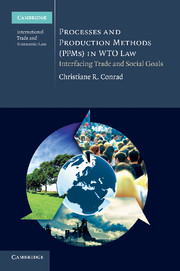Book contents
- Frontmatter
- Contents
- List of figures and tables
- Preface and acknowledgements
- Table of GATT 1947 Reports
- Table of WTO Reports
- List of abbreviations
- Introduction
- I Foundations: the relevance of NPA measures at the interface of domestic regulation, economic globalization and world trade law
- II Legal analysis: reviewing the status of NPA measures de lege lata
- III Outlook: new perspectives on the legal status of NPA measures
- 7 The interface of international trade and public policies: an overview over existing proposals for reform
- 8 A regulation-based perspective on NPA trade measures
- Summary and concluding remarks
- Bibliography
- Index
8 - A regulation-based perspective on NPA trade measures
Published online by Cambridge University Press: 05 June 2011
- Frontmatter
- Contents
- List of figures and tables
- Preface and acknowledgements
- Table of GATT 1947 Reports
- Table of WTO Reports
- List of abbreviations
- Introduction
- I Foundations: the relevance of NPA measures at the interface of domestic regulation, economic globalization and world trade law
- II Legal analysis: reviewing the status of NPA measures de lege lata
- III Outlook: new perspectives on the legal status of NPA measures
- 7 The interface of international trade and public policies: an overview over existing proposals for reform
- 8 A regulation-based perspective on NPA trade measures
- Summary and concluding remarks
- Bibliography
- Index
Summary
But more importantly, trade is a means to an end; and the end is raising the standards and conditions of living of all.
Most suggestions relating to linkage of trade and social policies discussed in Chapter 6 above focus on a particular issue area, such as environmental protection or labour rights. It seems, however, that a number of important legal questions or considerations relating to NPA measures are equally relevant for such measures, no matter which public policy objectives they pursue. This chapter develops a more general approach, or rather a perspective, on substantive questions concerning NPA measures.
The starting point is the well-established premise that rather than being an objective in itself, freer international trade is merely the means chosen by WTO members to achieve a number of broader economic and social objectives. Underlying the choice of this tool are the convincing rationales of free markets developed in economic theory. In cases where markets fail totally or in part, however, economic as well as non-economic objectives of the system cannot be reached by the tool of choice, namely, international trade. At this point, alternatives need to come into play in order to allow the system to adhere to its objectives. At the domestic level, a common alternative means by which to achieve economic and non-economic goals is state intervention by regulation, including regulation by means of NPA measures.
- Type
- Chapter
- Information
- Processes and Production Methods (PPMs) in WTO LawInterfacing Trade and Social Goals, pp. 451 - 484Publisher: Cambridge University PressPrint publication year: 2011
- 1
- Cited by



